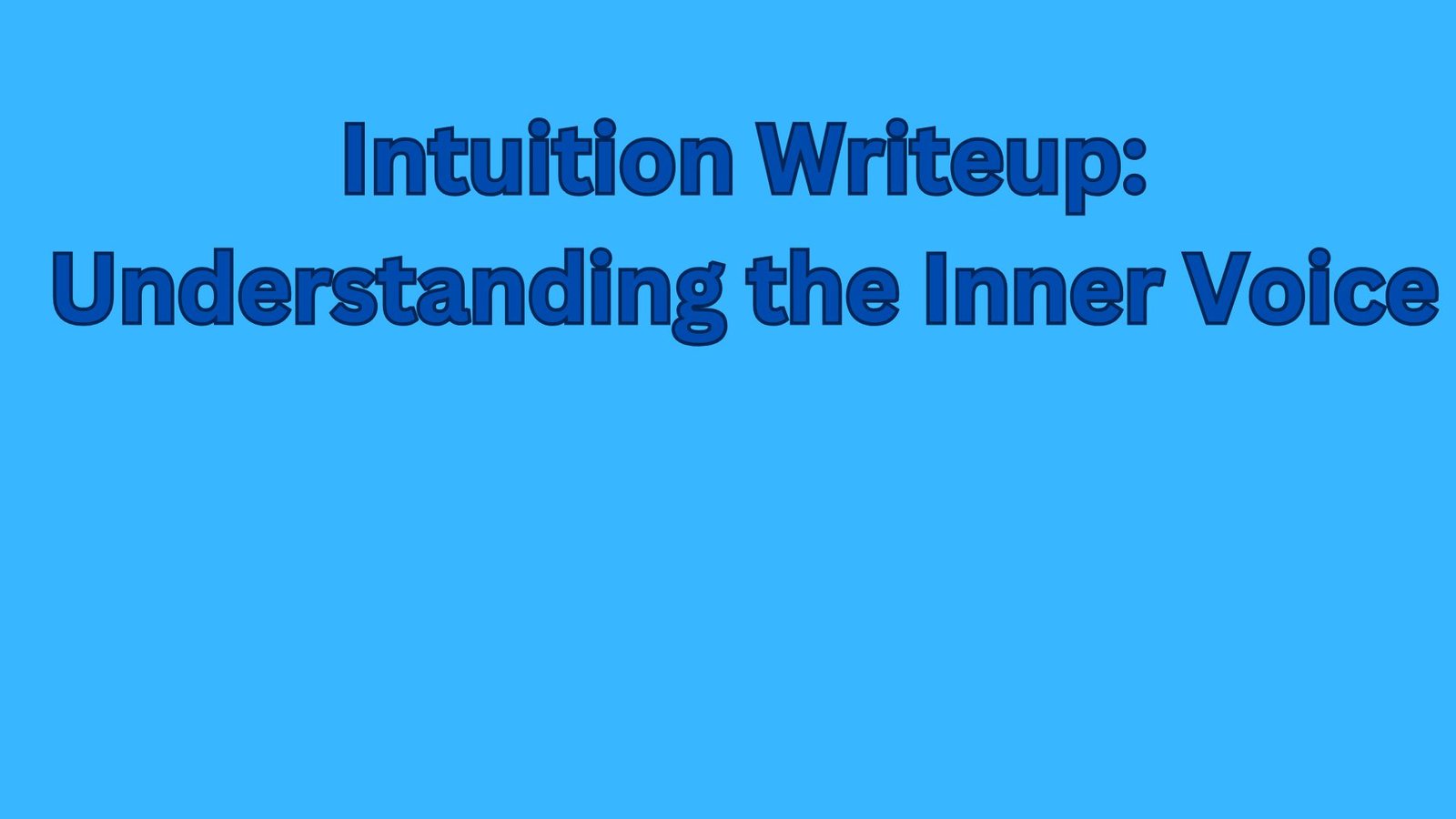Intuition is a powerful yet often misunderstood phenomenon. It manifests as a gut feeling or an instinctive understanding that guides us in decision-making and problem-solving. This comprehensive writeup explores intuition, its significance, the science behind it, and practical ways to cultivate it in daily life.
What Is Intuition?
Intuition is the ability to understand something immediately, without the need for conscious reasoning. Often referred to as a “gut feeling,” intuition can guide our choices, helping us navigate complex situations where logic may fall short.
The Importance of Intuition in Decision-Making
Intuition plays a vital role in how we make decisions. In many scenarios, particularly those involving uncertainty, our intuitive insights can lead us to the right choices. Successful entrepreneurs and leaders frequently rely on their intuition to make quick decisions in high-stakes environments.
Intuition vs. Logic
While logic relies on systematic analysis and reasoning, intuition draws upon our subconscious knowledge and emotional insights. Both are essential, but intuition can provide a unique perspective, especially in fast-paced situations where immediate action is required.
The Science Behind Intuition
How the Brain Processes Intuitive Thoughts
Research in neuroscience suggests that intuition arises from the brain’s ability to process information rapidly. Our brains are wired to recognize patterns and connections subconsciously, enabling us to make quick decisions based on previous experiences.
The Role of Emotions
Emotions play a significant role in shaping our intuitive responses. A strong emotional reaction to a person or situation can serve as a cue, signaling whether to approach or avoid it. Understanding this emotional connection can enhance our ability to interpret intuitive insights.
Case Studies in Intuition
Healthcare Professionals: Doctors often rely on their intuition when diagnosing patients. Their training and experience enable them to recognize subtle patterns that may not be evident through logical analysis.
Athletes: Many athletes depend on intuition during competitions, using their instincts to read opponents and make split-second decisions.
Cultivating Your Intuition
Listen to Your Gut Feelings
Start paying attention to your gut feelings. When you sense a strong reaction, take a moment to reflect on the context and your emotions. This awareness can help you better understand how your intuition communicates with you.
Practice Mindfulness
Engaging in mindfulness practices, such as meditation, can enhance your intuitive abilities. By quieting the mind, you create space for intuitive thoughts to emerge, allowing for clearer insights.
Maintain a Journal
Keeping a journal of your intuitive experiences can be beneficial. Document moments when you followed your intuition and the outcomes. This practice helps identify patterns and strengthens your connection to your intuitive self.
Trust Your Instincts
Building confidence in your intuition requires trust. Challenge yourself to act on your gut feelings and observe the results. Over time, you’ll develop a more robust intuition.
Seek Solitude
Spending time alone can foster a deeper connection with your inner voice. Whether through nature walks or quiet reflection, solitude allows for clarity and self-awareness.
The Role of Intuition in Daily Life
Relationships
In personal relationships, intuition can help you gauge the authenticity and intentions of others. Trusting your instincts can lead to healthier connections and improved communication.
Career Choices
Intuition plays a significant role in professional decisions. Listening to your gut can guide you in choosing the right career path, networking effectively, and navigating workplace dynamics.
Creative Expression
For artists, writers, and musicians, intuition is often a driving force. It allows for spontaneous creativity, leading to unique ideas that may not surface through logical thinking.
Challenges and Misconceptions
Common Misconceptions About Intuition
Intuition Is Just Guesswork: While intuition may feel like a guess, it is often rooted in subconscious knowledge and experiences.
Intuition Is Always Right: Although intuition can be powerful, it is not infallible. Emotional biases and preconceived notions can influence intuitive judgment.
Overcoming Challenges
To effectively use intuition, it’s essential to balance it with logical reasoning. Recognize when intuition serves you well and when careful analysis is necessary. Awareness of personal biases can also enhance your intuitive decision-making.
Conclusion
Intuition is a valuable asset that can enrich our decision-making, creativity, and interpersonal relationships. By understanding its nature, practicing mindfulness, and learning to trust ourselves, we can cultivate our intuitive abilities. While it’s important to acknowledge its limitations, finding a balance between intuition and logic can lead to a more fulfilling and successful life.
ALSO READ:Meet The Team Aggregate: Discover Our Collective Expertise
FAQs
What is the difference between intuition and instinct?
Intuition is based on subconscious knowledge and experiences, whereas instinct refers to innate responses to specific stimuli.
Can anyone develop their intuition?
Yes, anyone can cultivate their intuition through mindfulness, reflection, and paying attention to gut feelings.
How can I tell if my intuition is right?
Reflect on past instances where you followed your intuition and analyze the outcomes. Over time, you’ll become better at recognizing when to trust your instincts.
Is intuition always reliable?
No, intuition is not infallible. It can be influenced by emotions and biases, so it’s important to balance it with rational thought.
How does intuition contribute to creativity?
Intuition often fuels creativity by allowing for spontaneous ideas and expressions that may not emerge through logical reasoning.

